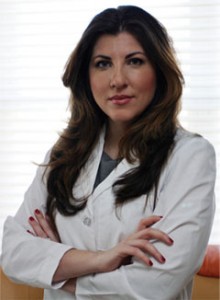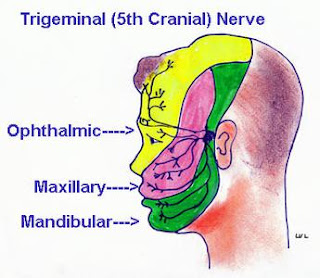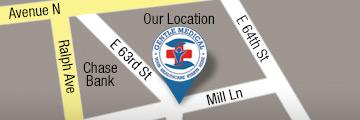Trigeminal Neuralgia (Facial Pain, Tic Douloureux)
Posted by admin on September 22nd, 2013

“Trigeminal neuralgia is an extremely painful condition affecting the nerves of the face. If you have symptoms of trigeminal neuralgia, don’t despair- help is available.”
-Dr. Bella Zimilevich, MD
What is trigeminal neuralgia?
The trigeminal nerve is a nerve in your face that carries nerve sensations from your face to your brain. In trigeminal neuralgia, this nerve malfunctions, so that the mildest forms of stimulation of the nerve (i.e., applying makeup, brushing your teeth) can cause excruciating pain.
Trigeminal neuralgia often starts with short episodes and progresses to longer and more painful episodes. The condition often affects older people, and women are affected more often than men. Although trigeminal neuralgia is extremely painful, treatment is available- you don’t need to be afraid that the pain will haunt you forever.
What are the symptoms of trigeminal neuralgia?
Symptoms of trigeminal neuralgia include:
- pain in the area supplied by the trigeminal nerve (teeth, lips, gum, jaw and sometimes the forehead and/or eye)
- pain triggered by chewing, talking, smiling, shaving, brushing your teeth, applying makeup or touching your face
- pain on one side of your face
- pain focused in one particular area or spread out over a wider area
- pain that begins as occasional mild twinges, progressing to episodes that are more painful and longer lasting
- episodes of pain lasting days, weeks, months or longer
What causes trigeminal neuralgia?
Trigeminal neuralgia is thought to occur when pressure is placed on the trigeminal nerve by a vein or artery at the base of the brain. This pressure causes the trigeminal nerve to malfunction. Sometimes a lesion such as a tumor applies pressure to the nerve, and sometimes MS, a condition in which the myelin sheath that protects our nerves becomes damaged. Many times a cause for trigeminal neuralgia cannot be found. The condition is more common after age 50, so aging may play a role.

What can I expect when I come to see you?
When you come to see me, I will first ask about your health history, your family’s health history, any medications you are taking and whether you have any allergies.
I will ask you the following:
- When did your symptoms start?
- How long do symptoms last? Do they come and go, or is the pain constant?
- What activities seem to trigger your pain? (i.e., talking, eating, smiling, touching your face)
- Have you ever had any facial trauma or surgery near the area where you are experiencing pain? (i.e. dental or sinus surgery)
- What have you tried to ease the pain? Was it effective?
- Do symptoms affect one or both sides of your face?
- Are symptoms getting worse over time?
- How does the pain affect your quality of life?
The answers to these questions will provide me with a lot of needed information so that I can make a proper diagnosis. I will also examine you, including the area where you are experiencing pain. If my examination causes pain, please be sure to tell me. If necessary, I will order an MRI to help me make the diagnosis. We can discuss the need for an MRI if one becomes necessary.
How is trigeminal neuralgia treated?
Medications are used first and are very effective for many people. The two main classes of drugs used are anticonvulsants (used for the nerve pain, not to prevent seizures) and antispasmodic drugs. These medications may have side effects such as drowsiness which will pass with time.
Should medications prove to be ineffective in treating your pain, I can refer you to a neurologist, who may suggest surgery to decompress the nerve, or injections that damage the trigeminal nerve so that it can no longer process pain signals. These procedures are not without risk and should be discussed with your neurologist. If you see a neurologist, I can work with your neurologist to treat you.
If I suspect that something other than trigeminal neuralgia is causing your pain, I may order other tests.
If you suffer from facial pain, make an appointment to come in to the clinic to see me. I can help you get to the root of the problem and treat your pain. Don’t delay- make an appointment today.
Our Location

6301 Mill Lane, Brooklyn, NY 11234.
(718) 942-4600



